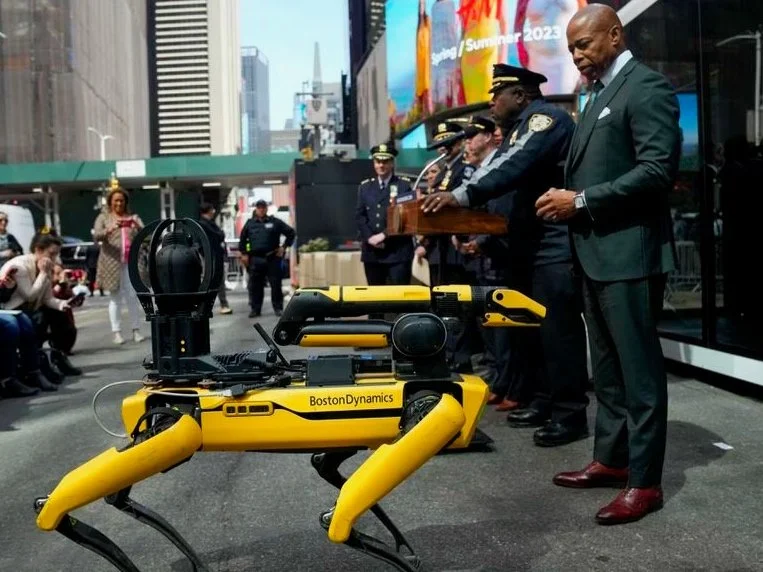Ring, one of the nation’s largest home security companies, engaged the Policing Project at New York University School of Law in civil rights and civil liberties audit, leading to substantial changes.
Oregon Sued Over Domestic Spying Operation
The Oregon TITAN Fusion Center is a covert domestic spying program run by the Oregon Department of Justice that targets the people of Oregon with aggressive and illegal surveillance. Our lawsuit, Farrell-Smith v. Oregon, is brought by environmental, indigenous rights, and social justice advocates who peacefully protested a $10 billion fossil fuel pipeline and were targeted by TITAN.
Axon AI Ethics Board releases update on recent work in 2020 EOY report
Last year saw a renewed focus on policing reform and the widespread deployment of new technologies, such as aerial surveillance and facial recognition. Amidst these changes, the work of the Axon AI Ethics Board was as vital as ever. Today, the Board releases its end of year report detailing its work over calendar year 2020.
The Policing Project's audit of Baltimore's Aerial Investigation Research Program
Policing Project Five-Minute Biometrics Primers: Lie Detection II—21st Century Tests
Policing Project Five-Minute Biometrics Primers: Lie Detection I—Polygraphs
Stream: Friedman discusses the intersections of policing, technology and the public interest
Policing Project to undertake independent audit of Baltimore PD’s aerial investigation program
Friedman examines facial recognition laws in U.S and Europe, and the need for increased action
Following his return from Belgium where he co-hosted a round-table on facial recognition legislation on both sides of the Atlantic, Policing Project founder Barry Friedman penned a new op-ed for Just Security exploring the differences in European and American approaches to regulating the tech and the urgent need for greater action.
10 Questions to Ask Your Law Enforcement Agency About ALPRs
Automated License Plate Readers are one of the most widely used law enforcement systems in existence. Unfortunately, because of lack of data and study, we know very little about how large the benefits or costs are—all the more reason every community should do its best to be informed about how its law enforcement is using ALPRs.
Policing Project Five-Minute Primers: Rapid DNA
Highlights from our convening on facial recognition
To conclude our Fall 2019 salon series, the Policing Project and the Information Law Institute hosted a discussion of the regulation of facial recognition. As more jurisdictions are using the tech to aid law enforcement, there are sharp societal disagreements on where to draw the lines between acceptable and unacceptable uses.
Policing Project Fall Salon Series Explores How to Effectively Regulate Police Use of Technology
This fall, the Policing Project kicked off our Tech Salon Series with two events. Our salons, made possible by support from Microsoft, enable us to vet our projects and discuss pressing issues around law enforcement’s use of technologies with a diverse set of experts, including privacy advocates, technology vendors, police chiefs, academics, legal experts, community leaders, and government officials.
As Axon eyes entry into ALPR market, Ethics Board calls for industry-wide regulation
The growing world of face recognition legislation: Our new guide to local and national regulations
Face recognition technology is increasingly being used by government agencies, particularly law enforcement, but while regulation of the technology is increasing, the rollout has been far from uniform. The Policing Project, with help from the Information Law Institute, conducted a review of enacted and proposed regulation across the U.S. and Canada, culminating in our new resource that analyzes trends in legislation and provides a table of nearly 200 proposed and enacted laws.
Policing Project Five-Minute Primers: Iris Recognition
In the second blog in our new series exploring the use of biometrics, we take a look at iris recognition, a technology being deployed nationwide – from the Southern border to Massachusetts –but one that has yet to see the news coverage and public discussion that have surrounded other high-profile biometric technologies.
Microsoft President Brad Smith visits Policing Project to talk the future of tech and democratic accountability
How should private companies, governments, and the public address concerns posed by new technologies, such as the loss of privacy, perpetuation of racial injustice, or the prospect of widespread government surveillance? Microsoft President Brad Smith recently visited NYU Law for a discussion of these issues and the new book “Tools and Weapons: The Promise and the Peril of the Digital Age.”
Join us for a conversation with Microsoft President Brad Smith, Sept. 13 at NYU
Technology has drastically shaped our society and our lives, with equal potential for both incredible good and devastating harm. Join us for a conversation with Brad Smith, President of Microsoft, to discuss his newly released book, Tools and Weapons: The Promise and the Peril of the Digital Age, in the context of policing technology, with special emphasis on the ethics of AI, privacy legislation and the need for regulation on facial recognition.
Facial Recognition: Q&A between a policy advocate and an AI practitioner
Policing Project Five-Minute Primers: Face Recognition
The Policing Project’s new blog series explores one of the more complex—and rapidly changing—areas of policing: the use of biometric technologies. For our first blog in this series, we explore face recognition, covering some common questions like, “How are police using this technology?” and “How does the technology work?”

























